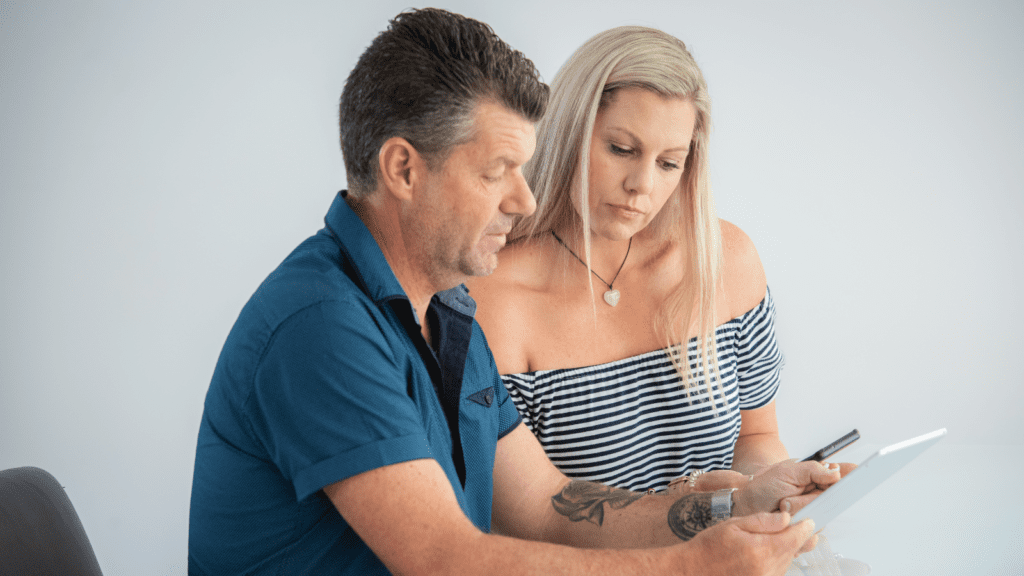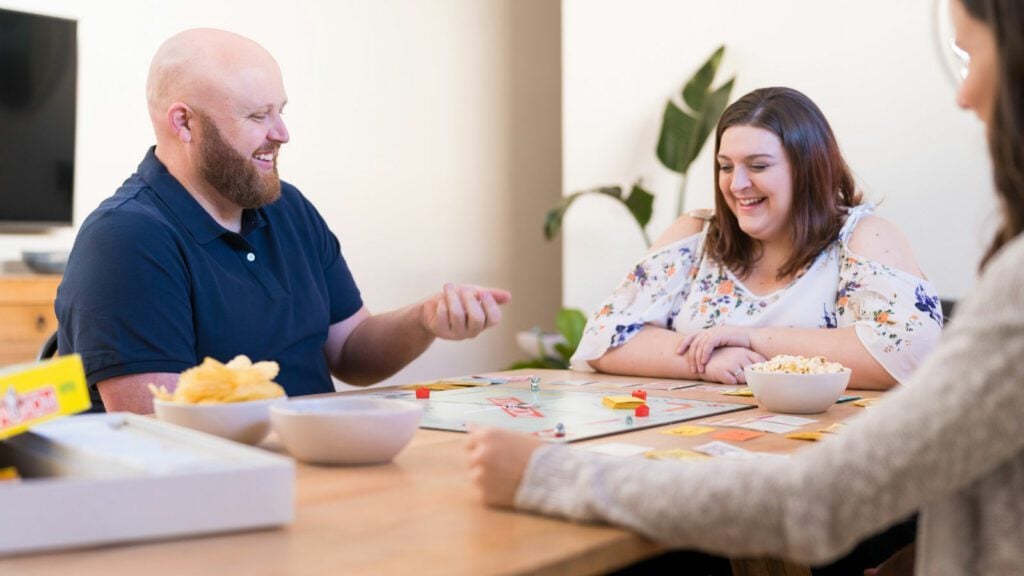How to talk about money in a relationship
Money can be a taboo topic in any relationship. But avoiding the topic altogether can lead to misunderstandings, resentment, and even breakups. Learning how to talk about money in a relationship is crucial for maintaining a healthy partnership.
One of the most important things to keep in mind when discussing money with your partner is to approach the conversation with empathy and understanding. Money can be a source of stress and anxiety for many people, so it’s important to be compassionate and non-judgmental. Australians today are under unprecedented levels of financial stress compared to twenty years ago, especially due to the rising costs of living and interest rates.
It’s not a stretch to say that talking about money in a relationship can be a delicate matter, especially if you or your partner have issues with money either now or in the past. In this article, we discuss what you should be mindful of when approaching this conversation and how to make sure you’re both on the same page.
Why talking about money matters in a relationship
Talking about money helps couples align their financial goals and priorities. By discussing your short-term and long-term financial goals, you can work together to create a budget and savings plan that works for both of you. This can also prevent arguments and disagreements about money in the future, as you’ll both be on the same page about your financial future. Remember, talking about money in a relationship isn’t always easy but it’s an important step towards building a strong and healthy partnership.
In addition to aligning your financial goals and priorities, discussing money can help build trust and transparency in a healthy relationship. Being open and honest about your financial situation can help avoid misunderstandings and surprises down the road. It’s important to approach the conversation with empathy and respect, and to listen to your partner’s perspective as well. Remember, talking about money in a relationship is a team effort, and it takes honest communication to make it work.
Understand each other’s money mindset
Understanding your partner’s money mindset is crucial to having a productive conversation about money. This includes their beliefs, attitudes, and values around money. Are they a saver or a spender? Do they think short-term or long-term? Do they prioritise experiences over material possessions? Understanding these differences can help you both come to a better understanding of each other’s financial habits and make compromises that work for both of you. It’s important to approach the conversation without judgement and to remember that everyone’s money mindset is unique.

Touching on that last point, our upbringings and unique personalities shape who we are and our opinions on important matters. This is especially the case when it comes to our attitudes towards money. Some of us may have grown up in a family where money was tight, making us more frugally-minded, whereas others may have enjoyed less financial pressure, so working off a budget may feel suddenly constricting. This isn’t to say that it’s always black and white, just that it’s important to consider that what may seem like a no-brainer to you isn’t necessarily the case for your partner.
Be honest about your financial situation
To have a successful conversation about money in your relationship, honesty is key. It’s important to be transparent about your own finances and financial issues, including any credit card debt, loans, financial goals you may have, or even your credit score. This conversation is vital to have prior to opening any joint bank accounts. It can be difficult to open up about money, but it’s crucial in order to build trust and work towards a shared financial future.
Telling your partner, ‘I have financial problems’ can be daunting but it’s important to be transparent about your personal situation. The conversation should also be about how you feel, not about blaming your partner for money problems and vice versa. Remember to approach the conversation with an open mind and empathy, and to actively listen to your partner’s concerns and goals as well. You’re both on this adventure together, so it’s only fair that you’re both equally prepared for it.
Set financial goals together
Once you’ve established open communication about your financial situation, it’s time to set some future goals together. These goals can include short-term goals, such as paying off credit card debt or saving for a fun purchase, as well as long-term goals, such as saving for a down payment on a house.
It’s important to make sure that both partners are on the same page when it comes to financial goals, and that you work together to create a plan to achieve them. Regular check-ins and updates can help keep you both accountable and motivated towards reaching your shared dreams.
from money worries
Create your own budget plan designed to help you live the life you want
Your shared goals should be the main focus, like getting into the property market, but it’s also important to add small individual goals out of respect for what you each give to the relationship – as long as the money is distributed fairly. Write each goal down in order of priority, with notes on ‘action required’ to achieve them.
Make a budget and stick to it
Sticking to a budget can be challenging, but doing so can ensure that you both have structured visibility of your financial situations. By using a budget, you’ll both have an idea of where you both are financially and how your financial goals are tracking.
The best way to budget as a couple begins with looking at your bank statements with your partner. Are your spending habits what you think they are? Try to develop a realistic table of your ‘essentials’ (e.g. mortgage repayments, electricity, etc) and ‘non-essentials’ (e.g. Netflix subscription, takeaway coffee, etc). Highlight any expenses – particularly non-essentials – that you can reduce to help you achieve your goals, such as renegotiating insurance premiums, cutting down on take away, or suspending the gym membership you’re not using much.
MyBudget’s automated system allows users to set up recurring payments to be processed automatically. In addition to not having to worry about recurring joint bills and household expenses, you can also set up automatic transfers to savings accounts to help you save money without even thinking about it – out of sight, out of mind.
Remember, the key to sticking to a budget is communication and compromise. Work together to make sure your budget is realistic and achievable for both of you. You can put together a joint budget draft with our personal budget template.
In our experience, the only budget that works has three key elements:
1. It’s realistic. Base it on actual expenses and income
2. It’s long-range. Include all of your income and expenses over a 12-month period, with contingencies for unexpected expenses or loss of income
3. It’s goal-focused. You should be able to clearly see debts, bills, living expenses, emergency fund and savings goals

Each person in the relationship should not only feel peace of mind that there is consensus on day to day expenses, but also see the pay-off of working together.
Have regular money meetings
To ensure you and your partner are on the same page financially, it’s important to take some time out to go over your budget together – you can playfully refer to them as money meetings. This can be a time to review your goals, discuss any upcoming expenses, and address any concerns or money issues that may have come up. It’s vital that money doesn’t become a ‘set and forget’ matter, or left for just one person in the partnership to manage without prior agreement.
Make sure you both have a chance to speak and listen to each other’s perspectives to ensure you’re both on the right track. By having these money meetings regularly, you can avoid any surprises or misunderstandings and work together towards your shared financial goals.
Avoid blaming or judging each other
One important thing to keep in mind during these money meetings is to avoid blaming or judging each other. Remember, you’re in this together and it’s important to approach financial decisions as a team and in a non-confrontational way. If one person is feeling defensive or attacked, it can quickly derail your conversations about money and lead to hurt feelings.
You have plenty of time to work through these things and you’ll learn plenty of financial lessons along the way, but finances is such a common cause of stress in relationships, so be sure to tread delicately and with care.
Seek help if needed
If you find that you and your partner are having difficulty communicating about money, don’t hesitate to seek out help. MyBudget has helped over 130,000 Australians live their lives free from money worries. In a free initial appointment, our friendly staff can help you and your partner put together a budget, factoring in your income, expenses, and financial goals. To get started, give us a call on 1300 300 922 or enquire online today.
